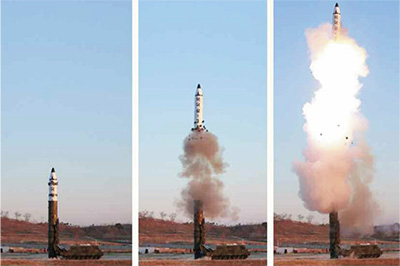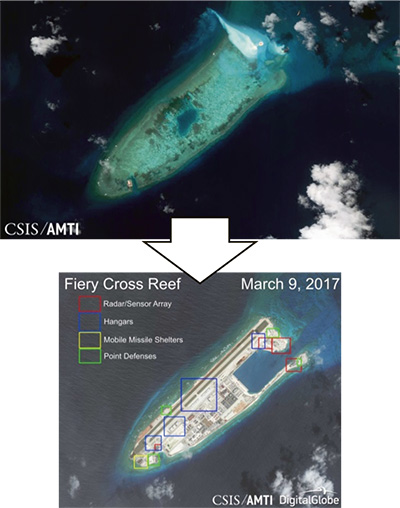Diplomatic Bluebook 2017
Chapter 3
Japan's Foreign Policy to Promote National and Worldwide Interests
1.National Security Initiatives
(1) “Proactive Contribution to Peace” Based on the Principle of International Cooperation
The security environment surrounding Japan is becoming increasingly severe. North Korea has reached a new level of threat, conducting two nuclear tests and launching more than 20 ballistic missiles since the beginning of 2016 despite strong and repeated calls for self-restraint from the international community, including Japan. China has been expanding its military capabilities, and increasing its national defense budgets by approximately 44 times over the past 28 years, lacking transparency as it has not provided any detailed breakdown. China has also been continuing its unilateral attempts to change the status quo by force or coercion at sea and in the air in the East and South China Seas, based on its own claims, which are inconsistent with the existing international order. Furthermore, there are widespread and diversifying global security challenges, including the proliferation of weapons of mass destruction, the growing threat of international terrorism, and emerging issues in new domains such as cyberspace and outer space. In such a security environment, any threats, wherever in the world they occur, could directly affect the security of Japan, and no nation can any longer maintain its own security alone.
Since the end of World War II, Japan has consistently followed the path of a peace-loving nation under the Constitution of Japan, and has proactively contributed to the peace and prosperity of the international community through cooperation with the international community as well as other international organizations including the United Nations. The posture that Japan has taken has garnered appreciation and respect from the international community. The international community expects Japan to play a more proactive role for the peace and stability in the world in a way commensurate with its national capabilities.
Continuing to adhere to the course that it has taken to date as a peace-loving nation, Japan will advance vibrant diplomacy under the policy of “Proactive Contribution to Peace” based on the principle of international cooperation, and will contribute even more proactively to the peace and security of the international community in order to respond to the requests from the international community.
 The ballistic missile, launched by North Korea on February 12, 2017
The ballistic missile, launched by North Korea on February 12, 2017 China's maritime structures confirmed to have been installed near the geographical equidistance line between Japan and China.(Photo: Ministry of Defense)
China's maritime structures confirmed to have been installed near the geographical equidistance line between Japan and China.(Photo: Ministry of Defense)Refer to the following website for the details: http://www.mofa.go.jp/mofaj/area/china/higashi_shina/tachiba.html (in Japanese)
 Undergoing land reclamation at Fiery Cross Reef in the South China Sea.
Undergoing land reclamation at Fiery Cross Reef in the South China Sea.Top: August 14, 2014
Bottom: March 9, 2017
Source: http://amti.csis.org/
(2) Enforcement of the “Legislation for Peace and Security,” and Initiatives Based on the Legislation
In order to adapt to the changes in the security environment surrounding Japan and to secure the lives and peaceful livelihood of its people, it is important to advance vibrant diplomacy to create a stable and predictable international environment. In addition, it is important to enable seamless responses to any situations, and to contribute even more proactively to the peace and stability of the international community under the policy of “Proactive Contribution to Peace” based on the principle of international cooperation. To achieve these objectives, the “Legislation for Peace and Security” took effect in March 2016.
This legislation aims to solidify Japan's orientation as a peace-loving nation, including adherence to its exclusively defense-oriented policy. The legislation strengthens the Japan- U.S. Alliance and enhances the deterrence of Japan, and thus enables Japan to prevent conflicts beforehand. Also, the legislation enables Japan to further contribute to the international community. In November, a specific initiative implemented under this legislation was the Cabinet decision to revise the Implementation Plan to enable the Engineering Unit dispatched to the UN Mission in South Sudan (UNMISS) to come to the aid of individuals engaging in activities related to UN peacekeeping operations upon urgent request. Given that the scope of goods and services that the SDF can provide was expanded under the “Legislation for Peace and Security”, a new Acquisition and Cross-Servicing Agreement (ACSA) was signed with the U.S. (September) and Australia (January 2017), and an ACSA was also signed with the UK (January 2017).
The Government of Japan has taken advantage of a variety of opportunities to thoroughly explain the “Legislation for Peace and Security” to foreign countries. Not only the U.S. but also a number of countries and organizations including Australia, ASEAN member countries, European countries, Central and South American countries, and the United Nations have expressed their understanding and support for this legislation3. This clearly demonstrates that the “Legislation for Peace and Security” is legislation that contributes to the peace and security of the world.
- 3 By the end of 2015, countries including the U.S., Australia, Indonesia, Malaysia, the Philippines, India, France, Germany, the UK, Bangladesh, Papua New Guinea, Sri Lanka, Canada, Dominica, Jamaica, Paraguay, Czech Republic, Finland, Georgia, the Netherlands, Slovakia, Israel, Jordan, Qatar, and Kenya, as well as regional organizations such as ASEAN and the EU, also expressed their support and welcome. In 2016, countries including Singapore, Argentina, Peru, Panama, Ghana, as well as the United Nations, expressed their support and welcome for the first time.
(3) Territorial Integrity
Maintaining territorial integrity is a fundamental responsibility of a state. Japan's policy to resolutely protect its land, sea and airspace remains unchanged. Japan will continue to maintain its stance of responding firmly but in a calm manner. Government agencies are working in close cooperation to advance measures to ensure a seamless and adequate response to any form of illegal acts. At the same time, the Government of Japan engages in proactive efforts to promote awareness of Japan's position on territorial integrity among the international community, making use of the contacts and knowledge of our diplomatic missions overseas.
